Over the course of the semester, PCURs will reflect on the professors, advisers, and friends who shaped their research experiences. We present these to you as a series called Mentorship in Research. Most undergraduates have met, or will meet, an individual who motivates and supports their independent work. Here, Zoe shares her story.
~~~~~~

The mentorship series asks us to examine the role of mentors in our lives as undergraduate researchers. Earlier this semester, Jalisha discussed the challenges and value of professors’ mentorship, and Emma reflected on peers as mentors. This post is an ode to the graduate student – actually, an ode to my favorite grad student, Cleo Chou.
I met Cleo the summer after my freshman year, when I was an intern through the Princeton Environmental Institute. Cleo’s Ph.D project is a field study of rainforest trees and how they respond to nutrient enrichment and limitation. This question has crucial implications for how we predict tropical rainforests’ responses to climate change.
I spent a month working with Cleo in Princeton, and then six weeks at her field site in Costa Rica, hiking through the rainforest and surveying the saplings in her study. Cleo and I were together 23 hours a day, every day, with my daily hour-long run our only substantial time apart. In the long hours of rainforest hiking, tree-finding, leaf-counting, and trunk-measuring, we talked about everything from our career aspirations to food to our families and friendships.

I was incredibly lucky to have this time to get to know Cleo – and have her get to know me – as a whole person. Since we returned from the rainforest, her mentorship has fundamentally impacted my research trajectory. Cleo connected me to other grad students with similar research interests, helped me navigate my relationship with my academic adviser, and offered perspectives on course choices (most memorably: “learn math while you can!”). Compared to most undergrads, grad students often have a wider, more insightful perspective on education and research. Yet, unlike many professors and professionals, they also remember what it is to be an undergraduate researcher – to be very curious, a little clueless, and uncertain about both research and future plans. I find it easy to be completely honest and genuine with Cleo, because I’m not fearing embarrassment or trying to impress.
Cleo’s ongoing support is particularly meaningful to me because she understands my interests as a person and also knows my capabilities as a researcher. When Cleo suggested I apply to present at an academic conference, I took her advice. The conference allowed me to enter an academic conversation for the first time, and taught me a new confidence in my work and myself. When Cleo told me she thought I was qualified to apply for a research fellowship the summer after my sophomore year, I knew she meant it. Her encouragement was the main reason I considered myself capable of applying for the fellowship. Undertaking this research project has since defined my independent work, and my academic experience at Princeton.
Several of my friends in the natural sciences have found grad student mentors in similar ways, developing a relationship over time in the field or the lab. These opportunities make it easy to forge a close personal relationship. Yet it’s also possible to get to know grad students in more ordinary contexts, and in my experience, grad students are eager to offer mentorship. Most probably had someone do the same for them.
My deep gratitude for Cleo’s support also serves as a reminder to pay forward the gift of mentorship. A little encouragement at the right time completely changed my undergraduate experience. I hope to one day do the same for someone else.
– Zoe Sims, Natural Sciences Correspondent

